The Philippines: No country for poor men
- Published
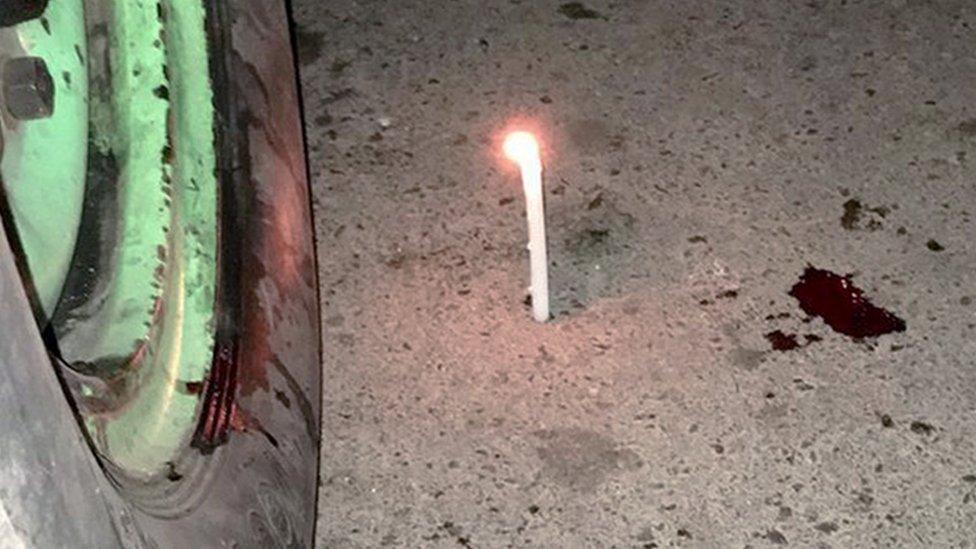
Rodrigo Duterte of the Philippines won his presidency with a promise of a brutal crackdown on drugs. But six months and more than 4,000 deaths later, a troubling picture of the profile of those being targeted is emerging.
Duterte's landslide victory came after a campaign during which he vowed to kill 100,000 criminals in his first six months in office and told drug pushers and others: "I'll dump all of you into Manila Bay, and fatten all the fish there."
But, beyond the fiery rhetoric, did the people of the Philippines ever consider the human and personal cost of their new president's anti-drugs campaign?
Maria sits in a wet, cobbled alleyway outside her three-room corrugated tin home in an overcrowded neighbourhood, looking at the body of her slain son as children play nearby.
It's wet because it's rainy season in the Philippines. It's overcrowded because there are several thousand people in this low-income urban village in Manila. And Maria's son Ferdie is the latest victim in President Duterte's War on Drugs.
The adults stay away from the wake, Maria tells me, because they're afraid. Association with Ferdie may be deadly: they don't want their sons to end up like him.
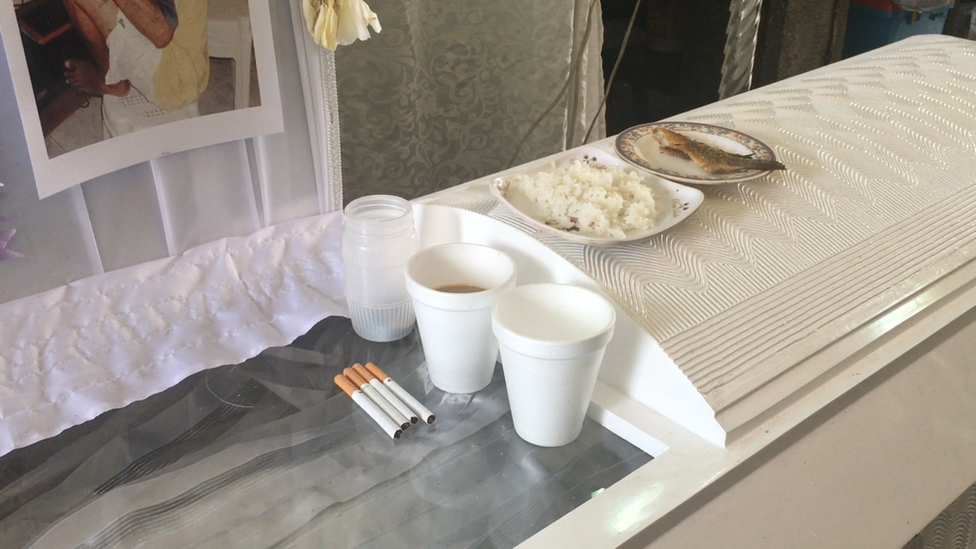
Ferdie's favourite worldly indulgences - cigarettes, tea, garlic rice and fried fish - have been placed on his coffin
This wake has lasted more than 10 days and has many more to go.
Maria asks one of her daughters to fetch the undertakers' bill. It's 40,000 pesos - about $800 (£640). This is more than a year's salary for Maria. She is Ferdie's sole living parent.
Her solution was to make a deal with the funeral director. She would take Ferdie's body home and he would come every week to inject it with formaldehyde and other preservatives to stave off decay. The director agreed.
Maria is not the only bereaved family member currently making this deal in the Philippines. Another funeral director told me that he had made dozens of arrangements like this. They are the families of men who have been killed, either by masked men or in police stings.
But, as he told Maria, this process has a shelf life - a couple of months at the most.
"What other choice do I have?" Maria whispers.
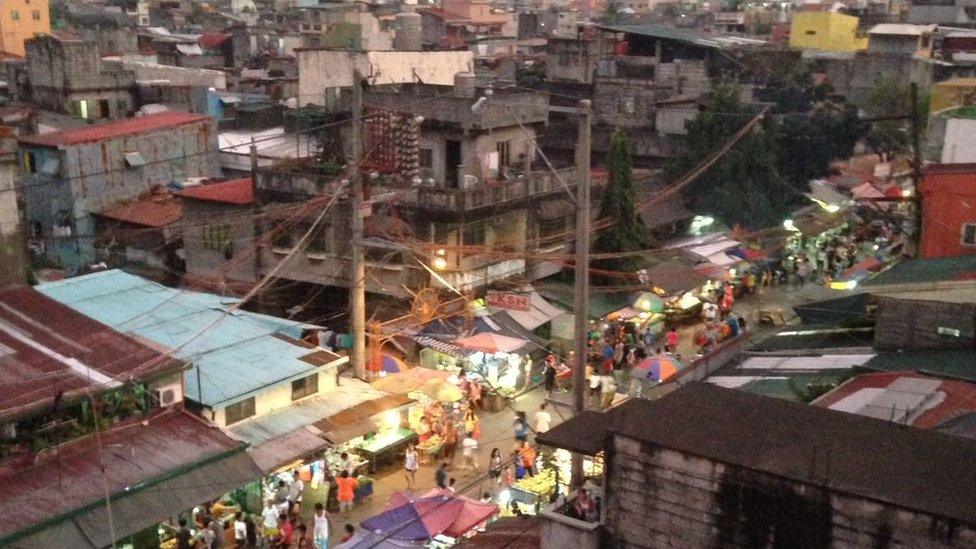
Most killings have occurred in or close to small, low-income, inner-city neighbourhoods of Manila.
Ferdie was 23 years old and he was a good boy, she explains. He financially supported the whole family. In a country with fewer than 20 rehabilitation centres, external, Maria admits that Ferdie had been a regular user of Shabu. But not for pleasure.
"Stimulants like Shabu are often used by poor people to work longer and harder as well as to suppress appetites for food they often can't afford," says Sanho Tree, the director of the Drug Policy Project, which is part of the Institute for Policy Studies think tank.
"In countries like Thailand, for example, truck drivers or banana pickers would use meth to work through the night shift."

Shabu is a slang term for the drug methamphetamine. The term is popular in Japan, Hong Kong, Philippines, Malaysia and Indonesia
In 2012 the United Nations said the Philippines had the highest rate of Shabu use in East Asia
The US State Department said 2.1% of Filipinos aged 16-to-64 use Shabu

When news spread in Maria's neighbourhood - or "barangay" - that a young man had been shot and killed by masked men, she knew it was her son. Her other children tried to reassure her that maybe it wasn't. Maybe it was another young man, they said. But she knew.
She knew because the first warning had come in October - three months after the president's promise that he would "eliminate" drug pushers in the Philippines.
Ferdie had been napping on a bench outside a shop near his home. Uniformed policemen arrived. They began to take photographs and collect fingerprints of young men in the neighbourhood.
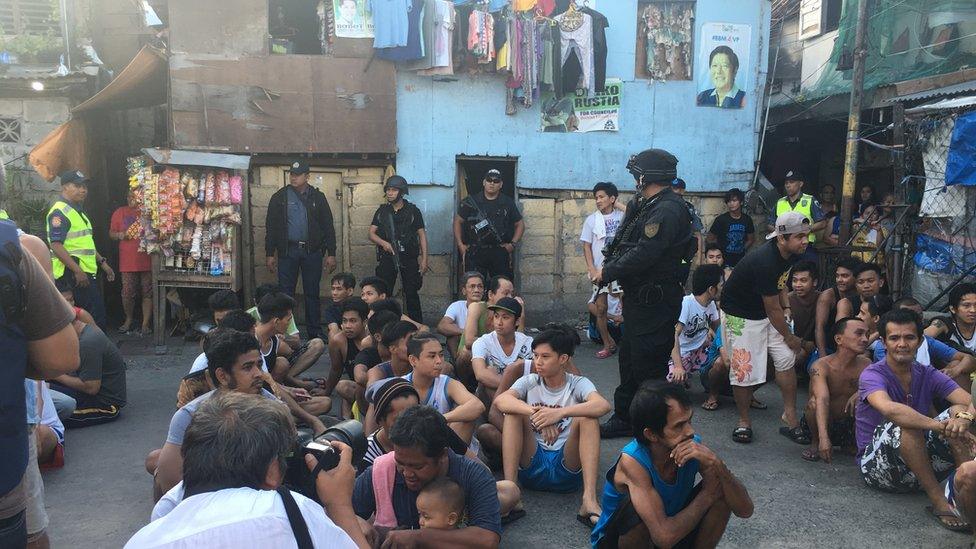
Police teams go to barangays to register names of men in the neighbourhood
This is a routine part of the Philippines' War on Drugs. I'd seen so myself at a Swat team raid my colleagues and I had attended a few days earlier. The policemen lined up men and began registering their names on a laptop at the scene.
I asked the police captain why he was documenting names. To keep the neighbourhood safe, he said. To check if any of the men had criminal warrants.
Were they collecting names for any other reason, I pressed, thinking of the rumours we'd heard about "kill lists" in the Philippines - the chilling documenting of drug users who would later be targeted.
No, was the answer.
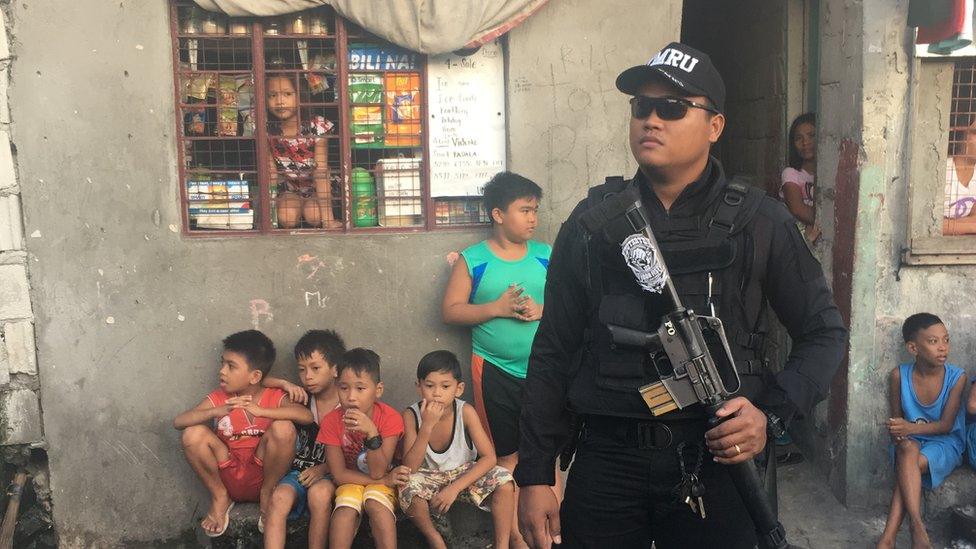
A policeman has a Duterte sticker on his gun as men are registered in one of Manila's urban slums
Maria says that this registering was identical to what happened to Ferdie that October day. Then, weeks later, masked men in civilian clothing arrived at Ferdie's workplace.
Maria heard that they told his employers that they wanted to "borrow him". That was the last time he was seen alive.
Maria's hands tremble as she takes a drag on her cigarette, her second in 10 minutes. Her eyes are fixed on her son's coffin, which sits in the alleyway outside the family's modest home.
I can see Ferdie's heavily made-up face through the glass panel of his coffin. On top of the casket the family have placed a fried fish, some rice, tea and cigarettes. These are all of Ferdie's favourite things, his sister Clara tells me. It'll send him happily on his journey to the afterlife, she adds smiling.
The War on Drugs - the terminology has now been softened to the Crackdown on Corruption - has resulted in more than 4,000 killings since President Duterte came to power in June.
He took office with words that promised a purge of the use of Shabu. And people believe him. He has a proven track record, after all.
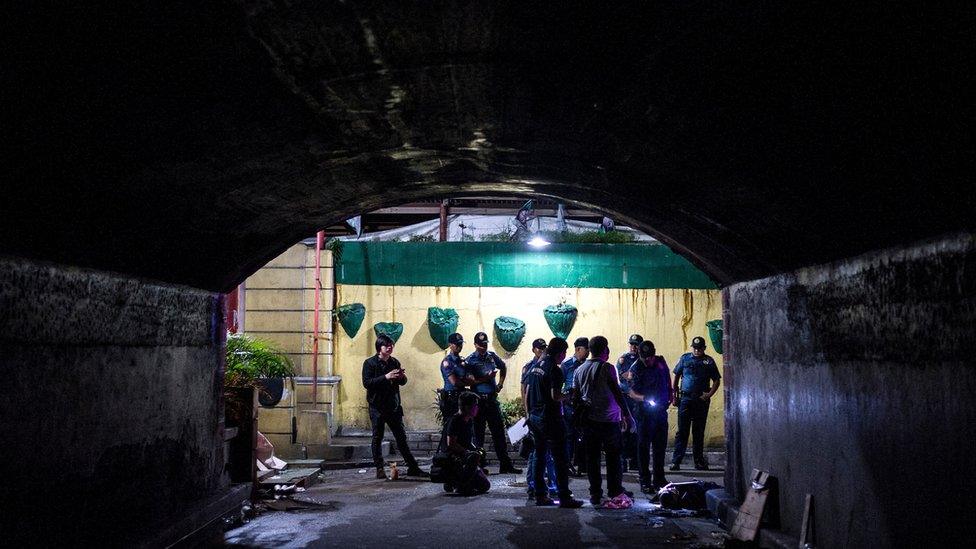
Police officers investigate a dead body with a cardboard sign on him that reads "I'm a pusher" in a street in Manila.
Here was a man whose 20-year tenure as mayor of the city of Davao had resulted in the rapid reduction of crime. There, the so-called Davao Death Squad - a group of masked vigilantes - had overseen the killings of thousands of Shabu users. The president didn't publicly ally himself with the group. He didn't publicly condemn them, either.
But, just as in Davao, there's something happening in the slums of Manila that seems inconsistent with the government's repeated assertion that they are targeting pushers or "drug lords".
I think back to conversations with the country's Official Commission on Human Rights, as well as Human Rights Watch; that this is, in fact, less of a "war on drugs" and more of a "war on the poor".
There are no official numbers yet on the type of people being targeted. The Human Rights Commission told me that, of more than 4,000 people killed in this "war", only 400 deaths are under investigation.
And, although there have been female victims, and high-profile ones, the vast majority of those killed are men from urban slums.
They are "the country's poorest, most marginalised, most vulnerable citizens", says Phelim Kine, deputy director of the Asia division of Human Rights Watch. "The victims have been unemployed or underemployed urban poor who eke out subsistence existences as street vendors or tricycle taxi drivers."
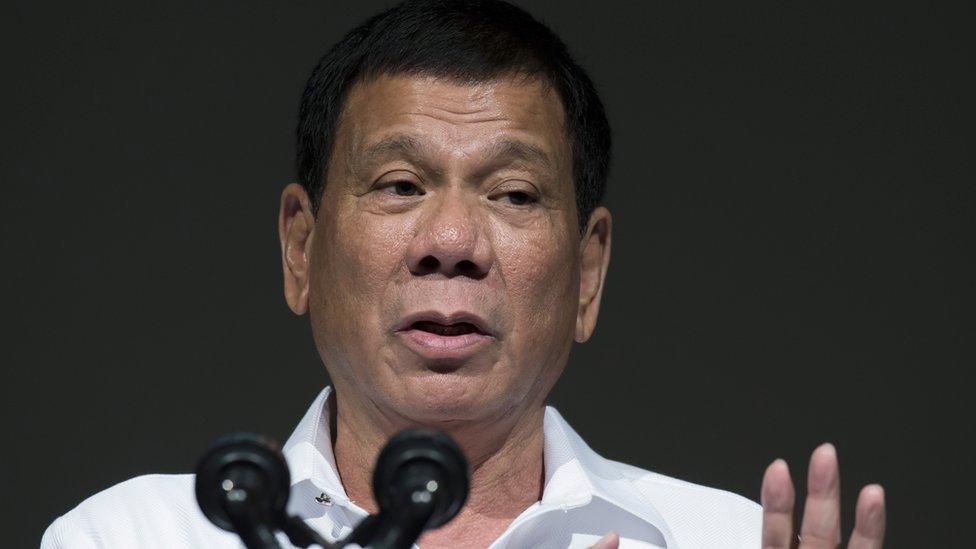
President Duterte told drug dealers: "Do not destroy my country, because I will kill you."
Back in Maria's barangay, Clara and her brothers and sisters don't leave their mother's side.
Their life, as watchmen of their brother's body, has morphed from mourning to the mundane that any routine brings.
They stay by their brother's coffin and ask passing adults if they want to play a game of cards, in the hope that people will donate any of the money gambled from the card games to their brother's funeral.
And their mother sits still on a bench, her eyes fixed in the middle distance, her stillness in contrast to the youthful animation that a routine extrajudicial killing hasn't extinguished.
We have approached the office of the president for comment. All names have been changed to protect the identity of individuals. Additional reporting by Kate Lamble.